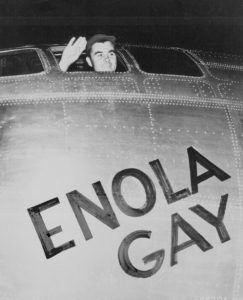Seventy-two years ago today a single U.S. Army Air Force bomber dropped a single bomb on a Japanese city and ushered the nuclear age into modern warfare.
The plane was called the Enola Gay, named after the mother of the bomber’s commanding officer, Col. Paul Tibbetts. The place was Hiroshima. The atomic bomb killed many thousands of Japanese civilians — quite literally in a flash of light, heat and unimaginable concussive force.
Aug. 6, 1945 has gone down in history as arguably the most compelling moment of the 20th century. American air power would drop another atomic bomb three days later on Nagasaki, Japan. The Japanese would surrender a few days after that and World War II would come to an end.
The debate has raged for seven decades: Should we have dropped the bomb? Did we have to kill so many Japanese civilians? Would the Japanese have surrendered without having to suffer such horrific destruction?
I have some proverbial skin in that argument. A young man was stationed in The Philippines when the bombs fell on Japan. He was serving in the U.S. Navy and well could have taken part in the invasion of Japan had it occurred. We also well might have died in the effort, denying him the chance to return home and start a family that resulted in, well, yours truly being born.
Dad made it home from that terrible war, got married and produced his family. I wrote four years ago about how the Hiroshima decision remains quite personal:
https://highplainsblogger.com/2013/08/hiroshima-gets-personal-with-me/
President Harry Truman had been in office only since April 1945; he assumed the power of the presidency upon the death of President Franklin Roosevelt. He only learned about the A-bomb development after he had taken the oath.
The newly minted commander in chief was handed some information that could have shortened the war by weeks, maybe months. Yes, the option before him would cost a lot of Japanese lives and he knew that at the top. He had to make a stern choice: Do I deploy this weapon knowing the destruction it will bring to the enemy’s homeland or do I risk sending our young men into battle at the cost of many thousands of American lives?
The president knew the consequences of the choice he had to make.
In my mind — and in my heart and gut — the president made the correct call. I cannot be objective or analytical about this. It’s personal, man.
God bless President Truman.
